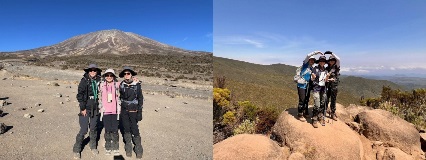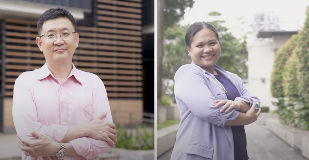Pao Yi (first from the right) in a simulated operating theatre as an NUS student
For Nursing graduate Chan Pao Yi (Nursing ’23), her goal is to be an oncology nurse in one of Singapore’s hospitals within the next year. This aspiration budded during an internship in her third year of university. “When I was attached to an oncology ward in Year 3 of my undergraduate programme, I was so inspired by the nurses there. I want to be just like them and help care for cancer patients,” she shared.
Since graduating, she has been working as a research assistant in NUS Nursing, pushing new frontiers in innovation for healthcare and in 2024, she finally achieved her dream of becoming nurse at an oncology ward in a hospital. “I wanted to explore my options post-graduation, but I’ve since realised that despite a nurse’s tough work, where I want to be is at patients’ bedsides. Patients are vulnerable, especially when they are in hospital. That’s when they need the most compassion and care.”
She became passionate about nursing after attending an NUS career talk. “At that time, I didn’t know what I wanted to be and I was contemplating on studying business like most of my friends. The career talk changed my path in life. When the speakers described the importance of nurses, and highlighted how nurses bridge the gap between doctors and patients, it really moved me.”
Pao Yi (front left) with her nursing course mates in Year 4
With her family’s financial difficulties, it was the NUS bursaries she received that made it possible for her to attain her nursing degree. Furthermore, in her third year of studies, Pao Yi received more good news. As a commitment to provide quality education for all, NUS launched the Enhanced Financial Aid Scheme (EFAS). Under the financial assistance Scheme, Bursary recipients’ tuition fees would be fully covered, and additional financial support would be provided for living expenses, on-campus stay and overseas programmes.
“I’m grateful to the donors who established the bursaries, because I cannot imagine my life now if I hadn’t received them,” said Pao Yi. “Without financial support, I would be working part-time to cover my expenses. It will impact my grades, and I would not have the time and energy to take part in meaningful community-based projects. It was through these projects where I made many close friends.”
Pao Yi (second from right) and her close friends celebrating their graduation at NUS Commencement
With financial support, she was able to take time to participate in social impact initiatives to help vulnerable groups in our society such as seniors with dementia and underprivileged girls. Under Project Lilac, Pao Yi mentored young girls in the community and taught them more about their health. With Project AdPIE, she helped create videos that educated nurses in Nursing homes on Nasogastric Tube feeding. As part of Project EDEN, she led an organising team to conduct a dementia day camp for the dementia community in Singapore.
Pao Yi (in grey) with her mentees and fellow mentors from Project Lilacs
Through these projects, Pao Yi experienced the joy of giving. “While participating in different projects can be draining, it also provides me with a deep sense of fulfilment. In the process, I realised that I genuinely enjoy helping others, like many of my nursing peers,” she concluded.
Jonan (right) with his close friend and fellow graduand course mate
For Life Sciences graduate Jonan Ling (Science, ’23), currently a medical technologist in local biotechnology start-up Lucence, performing high complexity genetic testing for cancer, financial aid was also vital. When he was fulfilling his National Service, his brother, who has autism and epilepsy, suffered a major seizure.
“His medical fees were already significant, but after the seizure, someone had to be with him at all times. My mother decided to be his main caregiver, so my dad was the only one earning money for our family,” he said. Although he was used to minimising his own needs and expenses to help his parents save money, his family’s financial situation became more precarious.
Fortunately, he received a bursary, support from EFAS and other financial assistance schemes from NUS, funded by generous donor contributions, that covered his school fees. “There was also some extra money left that became my allowance to live and eat,” he added.
Before graduating, he interned with Hummingbird Bioscience, a start-up specialising in new types of cancer treatment. The financial support he received reinforced his commitment to give back to society by advancing innovation for healthcare, a goal he now pursues through his medical diagnostics role at Lucence. Just as importantly, it has also enabled him to better support his family. “I give my mother some money every month, and if there are household expenses my parents need help with, I chip in too. I am where I am today because of NUS and the financial aid I received,” he concluded.






